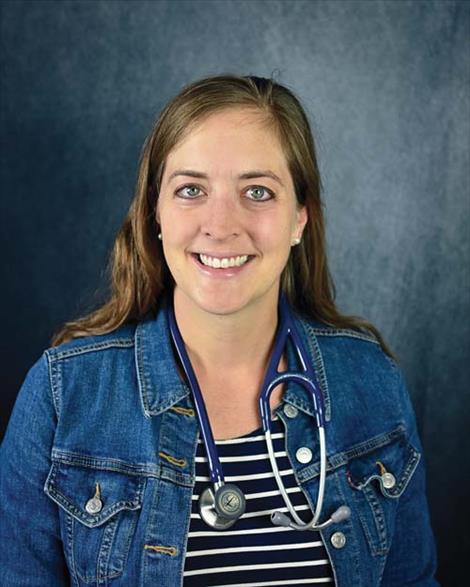New Public Health Officer shares information on vaccines
Hey savvy news reader! Thanks for choosing local.
You are now reading
1 of 3 free articles.
Dr. Megan Vigil, who was recently appointed by the Lake County Commissioners as the county’s new Public Health Officer, says she wasn’t particularly focused on the coronavirus pandemic when she applied for the post.
“I just thought it’d be cool to be involved in public health and preventative care and some of the larger practices of the county as a whole,” she says.
Vigil, a family practice physician with St. Luke Community Healthcare in Ronan, replaces Dr. Nichole McKinsey, who stepped down after two terms (2016-’20). The health officer’s position with the Lake County Board of Health, which meets every other month, is largely educational and advisory.
Vigil grew up in Anchorage, AK, earned her undergraduate degree from the University of Idaho in Moscow, and a master’s in public health with an emphasis on epidemiology from the University of Washington in Seattle.
A two-year stint in the Peace Corps, serving in The Gambia, followed. Her time in the tiny West African nation was spent implementing local public health programs, ranging from immunizations to assessing babies’ growth, and helping out with public education campaigns. She also organized computer classes for nursing students and helped village women raise funds for a community garden.
The slower pace and emphasis on community were a sharp contrast to the consumer-driven society and fast-paced interactions of her home country. “It was more about the person than the tasks at hand,” says Vigil.
Upon returning to the U.S., she decided to become a doctor, earning her medical degree at the University of Washington and completing her family-practice residency in Missoula.
The Mission Valley, where she moved in 2016 to practice medicine at St. Luke, reminds her of some of those values that impressed her in The Gambia. “I think there are a lot of classic, valuable traditions that are still maintained here,” she says. “People look out for each other and they’re hardworking and caring and genuine.”
She steps into her new role at a time when public health workers across the nation are finding themselves at the center of a political firestorm over COVID-19 precautions, even as they try to cope with the worst pandemic in over a century. Close to home, the Flathead Valley has seen an exodus of public health professionals, tired of being vilified by citizens and undermined by local government officials.
“I understand that’s a reality and … it’s not a positive thing,” says Vigil. “That’s not what most of us who went into medicine or public health want to become. We don’t want to be in those situations where our recommendations aren’t being heeded.”
So far, Lake County appears to have avoided much of that vitriol. Vigil hopes that tone of civility continues.
“I can throw my voice in and hopefully be as persuasive as I can,” she says. “I can guarantee that we’re going to disagree on things but I’m hoping we can do it in a civil way and still keep the greater good in mind.”
While she has yet to participate in a health board meeting (the next one is Feb. 18), she does express concerns about the ongoing threat that COVID-19 poses to the community.
“I can say without hesitation that I don’t think enough people are wearing masks from a public health standpoint,” she says.
While she understands that the county has limited enforcement clout, she and her colleagues continue to appeal “to people’s sense of humanity and desire to protect others.”
She’s an avid proponent of the new COVID vaccines, which were first available in Lake County in late December. As of Jan. 8, more than 33,000 doses had been given to frontline healthcare workers across Montana. Distribution was also well underway last week at long-term care facilities, including Providence St. Joseph Assisted Living in Polson and St. Luke Extended Care Facility in Ronan. The Tribal Health Department is also delivering vaccines to those in prioritized groups.
Phase 1b comes next and was recently changed by incoming Gov. Greg Gianforte to include those 70 years and older, those 16-69 with high risk medical conditions and American Indians and other people of color who may be at elevated risk for COVID-19 complications.
Frontline essential workers, including teachers, first responders, grocery-store clerks, corrections workers and postal employees, were moved to phase 1c, which also includes those 60 years and older, individuals living in congregate care and correctional facilities, and people 16-59 with adverse medical conditions. Phase 2, expected to arrive by mid-summer, covers the rest of the population, 16 and older.
Vigil was somewhat concerned about the governor’s decision to put older and high-risk Montanans ahead of frontline workers in phase 1b. “While I do agree that priority should be given to those with high-risk conditions, I do not believe that they should be prioritized above first responders, who are at higher risk of exposure given their work,” she says.
Vigil, who received her first shot last week, noted that she has yet to hear of any major common adverse side effects, either locally or across the U.S. She added that the delivery of vaccines at St. Luke appears to be going smoothly. “People make an appointment, come in, get their shot, they’re observed for a little bit and then they go,” she says.
She hopes people across the county and Flathead Reservation will be eager to take their turns. “We want everyone chomping at the bit to get this vaccine,” she says. “We want our vaccine appointment slots booked solid.”
Beyond COVID, the new public health officer has an abiding interest in obstetrics and baby and maternal health (she’s the mom of month-old infant and 2-year-old sons). She’s also concerned about substance abuse disorders and hopes to make the public more aware of the medication-assisted treatment programs that are available in Lake County, where opiate-use disorder is prevalent.
“We need to stand behind these programs and make sure they are very easily accessible for the patients who need treatment because it’s a hard step to take,” she says. “We see the impact that these disorders have on the lives of our patients, who really just want to get back to their normal lives.”
Overall, Vigil looks forward to offering “a voice of science and medicine to what are also going to be really complex choices and decisions that the commissioners have to make. They have to take more into account than just what the scientific research tells us. They have constituents as well.”
















